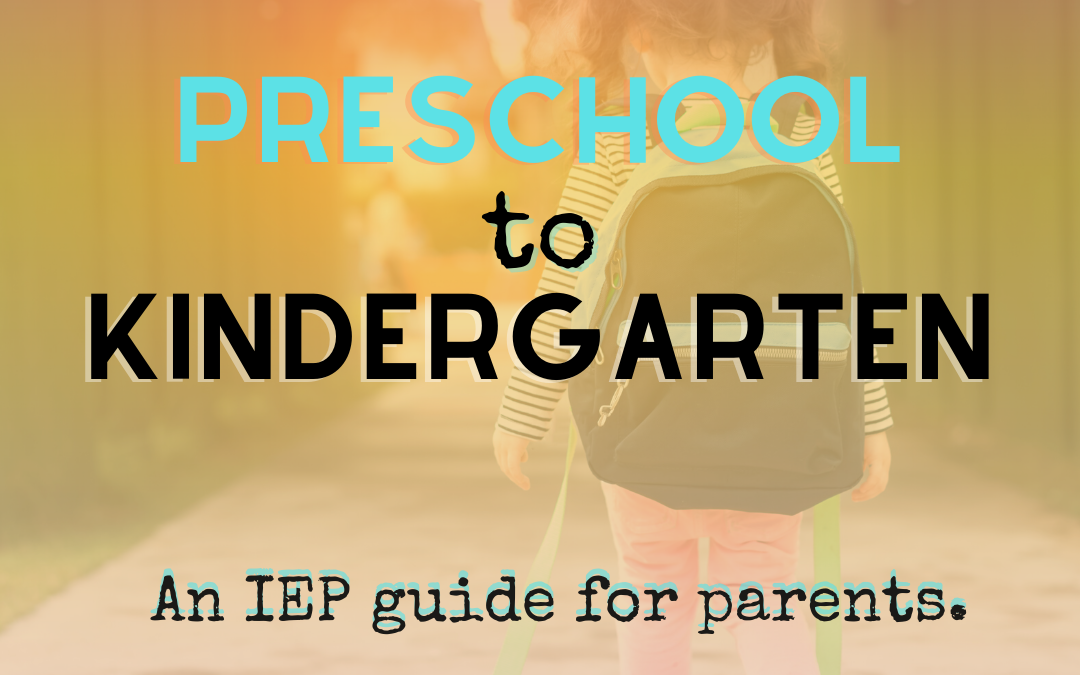No one prepares you for these things! How is it that these sweet babies grow so quickly?
Even experienced parents will experience some anxieties about transitioning to a new grade, but what happens when you are moving to a whole new LEVEL of school? I’m breaking down some pointers for my IEP parents to remember as our kids grow and transition to a new school, new team and next step in education.
Keep in mind, this is not an all inclusive list and your school SHOULD be supporting you through this. However, as an IEP parent myself, I can tell you that there will be things the school didn’t tell you, that you wished you would have known. Don’t leave it all up to the school to get your child prepared because YOU know what your child needs at every stage. You are the most consistent member of the IEP team and your input matters.
Here are a few tips…
Typically, at the end of the year, there will be some sort of transition meeting. Even if you have already had your annual IEP meeting, an end of year meeting can be helpful to meet the new team and make sure the IEP is set up to support your child in the next environment. The team members may change prior to school starting, but meeting some of them will allow you to ask questions that the preschool team just doesn’t know.
This is also a good time to discuss and finalize any placement decisions. You can ask to tour the suggested placement and other placements too! Touring multiple placements allows you to determine what is right, and what isn’t a great fit for your student.
Questions to ask:
- Do we know who my child’s teacher will be? Why are we choosing that person for my child?
- Is there a time to tour?
- Is there a social story with pictures of the new building?
- Social stories at this age are GREAT tools to help with the transition! Use real pictures and include some things to expect. “At my current school, my teacher is someone I can trust. At my new school, my new teacher will be there to help me too.” “Here is what my classroom might look like.” BONUS: Add pictures of preferred toys/ activities to get them excited. You can always create a social story, but the school can help with that too.
- What needs to change in the IEP?
- Are related services increased because the day is increased?
- Will those services still be pushed in or will they change?
- What will placement be like? Who will my child’s peers be?
- What is the approximate class size?
- Will there be an additional staff/ aide in addition to the teacher?
- When will my child have access to general education curriculum and peers?
- Will transportation change? If the bus is new, will there be a practice run or at least a time to check out the bus?
- Who will inform the new staff about my child’s IEP? Will I be able to speak with the teacher prior to school?
- If I have a concern, who is my main contact?
- How often will I get communication about my child’s day? (If you need more, ask for it!)
- What is the daily schedule? Can they share it with you ahead of time?
- Are there cubbies or lockers?
- What are arrival and dismissal routines? Does your child need a visual?
- Does my child need a Behavior plan? How will that be updated in the new setting?
- Is the playground accessible? Who will be supervising and how many?
- What about “specials”? (music, art, PE, stem etc)
- Do you have food allergies to make the school aware of? How is that handled at lunch?
- Will medication be needed during the day?
Things to do at home:
- Drive by the school and talk about where the bus is, check out the playground, walk around outside. Most kids will need this more than once. But getting them familiar with what to expect can ease some anxieties.
- Read the social story over the summer, especially when school gets ready to start.
- Practice with eating lunch. Lunch can be a stressful time because it’s usually much shorter at school than at home. Practice eating out of the lunch box, opening packages, packing everything up and try to keep to the school schedule.
- Practice self help skills. Pulling up and down pants, zipping coats, hanging back packs, packing back packs etc. These things are more independent skills and may be more difficult for some students. If your child is unable to do these things, what accommodations are needed to support them?
- Prepare an All About Me page to share with the new team. Include strengths and motivators, things to look out for, what happens when things get hard, how does your child learn best, what do you need from the teacher and new team etc.
- Get your paperwork organized. Here is a binder organizer to help you get started.
Don’t be afraid to ask for a second opinion!
Many parents are overwhelmed with the IEP process and adding in a big transition like Kindergarten can make things even more overwhelming. There will always be something you wish you would have done, but asking the right questions can be helpful to prepare. If your child can’t do some of the things above, or you know they will struggle with transitions, routines, expectations etc, ask for accommodations to support your child. You don’t have to know what to ask for necessarily if you know what the problem is. You can even ask for a meeting at the beginning of the year to discuss the IEP and ensure that everything is appropriate. Don’t be afraid to ask the questions you need to.

